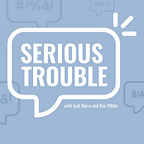Dear listeners,
People get really weird when a murder suspect is hot, huh? Anyway, Luigi Mangione’s been arrested at a McDonald’s in Pennsylvania and he’ll eventually be sent to New York to face charges over the murder of United Healthcare CEO Brian Thompson. But first, he needs to be extradited, and he’s resisting that. Mangione will ultimately be brought to New York even as he objects — probably within a few weeks — but Ken and I talk about why it can make sense for a defendant to delay the inevitable.
Also in New York, Daniel Penny has been acquitted of criminally negligent homicide in the killing of Jordan Neely. But first, the jury hung on the more serious charge of manslaughter, setting off fighting between the prosecution and the defense over whether it was proper to dismiss that charge and send the jury to consider a lesser one. (Judge Maxwell Wiley ultimately agreed to dismiss the manslaughter charge, as the government wanted.) Ken and I talk about how juries can get weird — if the jury could unanimously agree that Penny had not been negligent when he killed Neely, why weren’t they able to agree that he had not been reckless, as they would have needed to find to convict him of manslaughter? — and we talk about the surprising subjectivity of the standards the jury was asked to apply. Whether or not Penny was a criminal hinged in part on whether he took actions that a reasonable person would not have taken — this led the jury to ask the judge exactly what “reasonable” means, a question that does not have a very satisfying answer.
InfoWars may not be sold to The Onion after all — bankruptcy judge Christopher Lopez says the auction process that led bankruptcy trustee Christopher Murray to accept the Onion’s bid over another offer (one that involved a higher cash price) was insufficiently transparent. In a classic judge move, Lopez told Murray to go back and try again, without telling him exactly what the right way is to sell off Infowars — and also told him to wrap this whole thing up by the end of 2025. We’ll see next month what new sale approach Murray proposes to Lopez.
Stanford professor Jeff Hancock was hired as an expert witness in a case about whether a Minnesota law prohibiting political deepfakes is constitutional. Hancock was supposed to present evidence about limits of traditional approaches to combatting misinformation when that misinformation is generated with AI. Unfortunately, Hancock used ChatGPT to help write his testimony, and ChatGPT hallucinated some fake cases, which Hancock went ahead and cited to the court. Oops! Some people thought this was a clever way for Hancock to illustrate the dangers of AI, but it appears that Hancock was actually just being lazy, not clever, which is maybe for the best — judges do not tend to enjoy it when you do “bits” in their courtrooms.
And finally, some Trump associates — Ken Chesebro, Jim Troupis, and Mike Roman — are facing additional charges in Wisconsin related to their efforts to steal that state’s electoral votes in 2020. Notably, they are now being accused of defrauding the fake electors, by falsely telling them the certificates they were signing were merely “contingent” and would be used only if the pro-Biden results in those states got thrown out. Ken and I discuss what President Trump will and won’t be able to do about the fact that several states continue to pursue his associates over 2020-related matters, even as his own prosecutions have fizzled in one way or another.
We hope you enjoy the episode,
Josh






